Why Every Athletic Booster Club is in Danger Because of Title IX
We’ve warned our readers many times about the danger that runaway Title IX enforcement poses to high school athletics. Earlier today, we got some news out of Pennsylvania that should send a chill up the spine of any parent who participates in a booster club for a high school sport—and what the College Sports Council believes is a deliberate misinterpretation of the law is the reason why.
The following was reported over at PhillyBurbs.com on Friday:
The Council Rock school board on Thursday approved a settlement agreement with the U.S. Department of Education over an allegation of possible disparity in school sports caused by disparate contributions to teams by booster clubs.
Superintendent Mark Klein said the agreement with the education department’s Office of Civil Rights is not a monetary settlement and “does not admit to liability on Title IX issues at all.”
Title IX of the Education Amendments of 1972 protects people from sexual discrimination in education programs or activities that receive federal financial assistance. The Office of Civil Rights has been auditing the school district for the past two years.
The audit was prompted by a parent who lives outside the Council Rock School District; Klein said a Cheltenham parent filed a complaint that included numerous school districts throughout the area, including Council Rock.
“They don’t allege that Council Rock is in violation of Title IX on its face,” Klein said. “It alleges that + the effect of certain adverse funding for booster groups can serve to create disparate impact for females or men.”
When they talk about “adverse” effects, what they really mean is that boys sports have an easier time raising money from boosters than girls sports. What they call “adverse” effects most of the rest of us would just call the discipline of the marketplace.
We strongly suspect that this settlement was prompted by the same complaint that was filed several years ago that we reported on back in October 2008. In the story we linked to then, it was reported that an OCR investigation was initiated after the mere formation of a football booster club at a high school in Bristol Borough, Pennsylvania.
At bottom, the Department of Education is contending that the establishment of independent athletic booster clubs is a violation of Title IX, and that the only way for them to operate without threat of an investigation is if every other high school athletic team is able to take a cut from the pot—even if teams who do nothing to raise money get to share in the funds that are raised.
We’ve already seen some school districts attempt to foist this system on unwilling parents. In November 2008, we pointed to a story out of Mercer Island, Washington, where the local school district was having a tough time convincing the locals that a unified booster club was the way to go:
Pattie Reutimann, parent liaison for the girls’ gymnastics and cheer booster clubs, said parents involved have met twice with administrators to discuss Title IX equity. Although plenty of ideas were examined during the meetings, little was accomplished, she said.
“The problem is, our existing individual booster clubs don’t have a lot of guidelines,” Reutimann said, adding that administrators have promised to create a detailed list of regulations. “Right now, everyone’s just doing what’s best for their kids.”
God forbid that should happen. Sounds to me like the booster clubs are operating just fine without a bevy of burdensome regulations.
But wait, there’s more!
This individual mentality, she pointed out, may hinder the success of a schoolwide club.
“It’s a good idea, but I just don’t know if all the little booster clubs can function under one big organization. If we have more than 100 football parents but only 10 for tennis, then should tennis get a proportionate amount when football is bringing in more money?” Reutimann mused. “How would they prioritize needs?”
And that, in a nutshell, is the problem we face here. If you’re a parent involved in a booster club of any kind, you ought to be very angry about this prospect.
